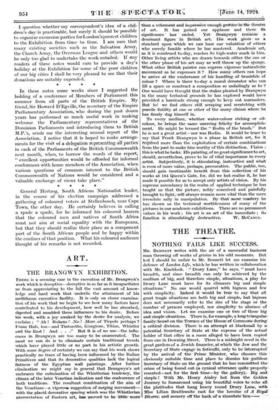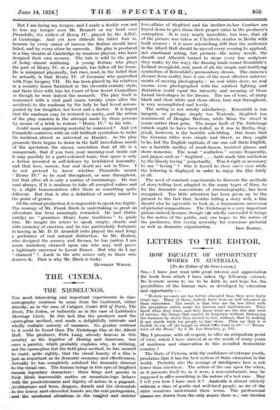THE THEATRE.
NOTHING FAILS LIKE SUCCESS.
MR. BENNETT writes with the air of a successful business man throwing off- works of genius in his Odd moments. But lest T should be unfair to Mr. Bennett let me examine his defence of London Life, which he has written in collaboration with Mr. Knoblock. "Drury' Lane," he says, "must have breadth, and since breadth can only be achieved by the medinm of big, And therefore simple, -situations, a play for Drury Lane must have for its climaxes big and simple situations." No one would quarrel with bigness and few with simplicity. Indeed it " Would be true to say that all great tragic situations are. both big and simple,- -but bigness does not "necessarily refer to the size of the stage Or the number of persons -employed, nor simplicity to -absence of idea and vision. -Let me examine one or two of- these big and simple situations. • There isJor=exampleia longtriangular. faniily, brawl on the Terrace of the-House-of Commons diving a critical. division. There is an attempt at blackmail by a.
• potential ;Secretary of State at the expense of the actual: holder of that office in a room alleged to have been copied -from one in Downing. Street. There is a midnight revel in the great gardens of a Jewish financier, at which the Jew and the Secretary of State engage in fisticuffs, only to be' interrupted by the arrival of the Prime Minister, who- chooses this • obviously suitable time and place to dismiss his guiltless- Secretary of State on the ground that he has -committed the crime of being found out (a cynical utterance -quite-properly) resented—not far the first time—by the gallery).- Big and, simple I With Mr. Henry Ainley hot from the Golden Journey to Samarcand using his beautiful voice-to echo all. the platitudes that hang heavy round Drury Lane, with, Miss Lilian Braithwaite cast for the heroine of A ROytit Devotee. and scenery off the back-of a -Chocolate . Rut I am losing my temper, and I,made a double vow not to lose_ my. temper , over Mr. Bennett or my head over Pirandello, the author of Henry IV., played by the A.D.C. at CaMbridge. And yet how difficult the latter feat is, because by every canon of success the _Italian should have artd by every other he succeeds. His play is produced in a tiny theatre at Cambridge by amateur players, who have designed their own scenery. The tale is wild to • the point of being -: almost. confusing.. A young Italian, who plays. ,the part of Henry IV, at a pageant, has fallen off his horse. lie is. uninjured physically, but rises, mad, in the belief that .he actually . is that Henry. IV. of Germany who quarrelled with Pope Gregory VII. He has beeaplaced by his relatives in a country ,house furnished in the eleventh-century style,. and there lives with him his Court of four Secret Councillors, as though he were indeed, the monarch. The play itself is concerned with a visit paid (some twenty. years after the accident) to:. the madman by the lady he had loved accom- panied by her daughter, her lover and a doctor. It is hoped that the madman may be restored, to sanity, and the action of the play consists in the attempt made by these persons by means. of a trick to restore " Henry IV." to his wits.
Could more unpromising material be conceived ? And yet, Pirandello contrives with an odd brilliant symbolism to make his madman almost as universal as Hamlet. As the play proceeds there begins to dawn in the, half, incredulous minds of the spectators the uneasy conviction that all life is a masquerade, that _if you turn your morning-coat inside out it may possibly be a parti-coloured tunic, that space is only a fiction, invented in self-defence by bewildered humanity, and that love,- sorrow, fear and death are not in Time.
do not pretend to know whether Pirandello meant "Henry .IV." to he mad throughout, or sane. throughout, but that after all is only a matter of terminology. He was mad always, if it is ;madness to take' allaccepted values and by a slight transmutation offer them as something quite different. But that is also a definition of sanity raised to the point of genius.
. Of the actual production it is impossible to speak too highly. The courage of Mr. Frank Birch in undertaking so great an adventure has been amazingly rewarded. He had (fortu- nately) no "grandiose Drury Lane traditions" to guide him. He taught his actors to speak simply, clearly, and with economy of emotion, and he was particularly fortunate in having in Mr. D. D. Arundell .(who played the mad king) a performer of real natural distinction. In Mr. Beaton, who designed the scenery and dresses, he has (unless I am much mistaken) chanced upon one who may well prove a legitimate successor to Lovat.Fraser. But why do I say " chanced " ? Luck in the arts comes only to those who deserve it. That is why Mr. Birch, is lucky..
• HUMBERT WOLFE.











































 Previous page
Previous page